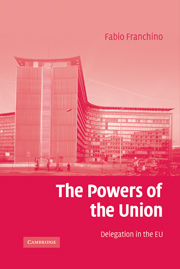Book contents
- Frontmatter
- Contents
- List of figures
- List of tables
- Preface
- 1 Introduction
- 2 A formal model of delegation in the European Union
- 3 Data and longitudinal analysis
- 4 Decision rules, preferences and policy complexity
- 5 Delegation in the European Union: quantitative analysis
- 6 Delegation in the European Union: case studies
- 7 The delegation preferences of the European Parliament
- 8 Conclusion
- References
- Index
8 - Conclusion
Published online by Cambridge University Press: 27 October 2009
- Frontmatter
- Contents
- List of figures
- List of tables
- Preface
- 1 Introduction
- 2 A formal model of delegation in the European Union
- 3 Data and longitudinal analysis
- 4 Decision rules, preferences and policy complexity
- 5 Delegation in the European Union: quantitative analysis
- 6 Delegation in the European Union: case studies
- 7 The delegation preferences of the European Parliament
- 8 Conclusion
- References
- Index
Summary
In any political system, when adopting a law, legislators set the boundary between legislation and administration, and specify the administrative bodies in charge of policy execution and the latitude of bureaucratic prerogatives. EU legislators can choose between two types of bureaucratic actors: a supranational institution, the Commission and national administrations. The options, of course, are not mutually exclusive, both can be involved in policy implementation. Nevertheless, the relative reliance on the Commission and national administrations vary considerably.
The aim of this book has been to explain this variance. When do EU legislators decide to centralize executive powers at the supranational level? When do they insert into EU law tight procedures and detailed policy instructions? When instead do they allow for ample discre-tionary authority? I have presented a theory of EU delegation that captures the incentives and constraints facing legislators when delegating executive powers and that takes into account the institutional peculiarities of the EU. The theory suggests that there are four main variables that explain who does what: (a) decision rules operating in the Council, (b) policy complexity, (c) conflict within the Council and (d) conflict between the Council and the Commission. Furthermore, involvement of the Parliament systematically affects the distribution of powers, as does conflict between Parliament, the Council and the Commission.
It is plausible that, when confronted with a legislative proposal, ministers of the Council have a strong bias in favor of national implementation, ample discretion and limited or no involvement (beyond Treaty-based powers) of the Commission.
- Type
- Chapter
- Information
- The Powers of the UnionDelegation in the EU, pp. 292 - 312Publisher: Cambridge University PressPrint publication year: 2007



